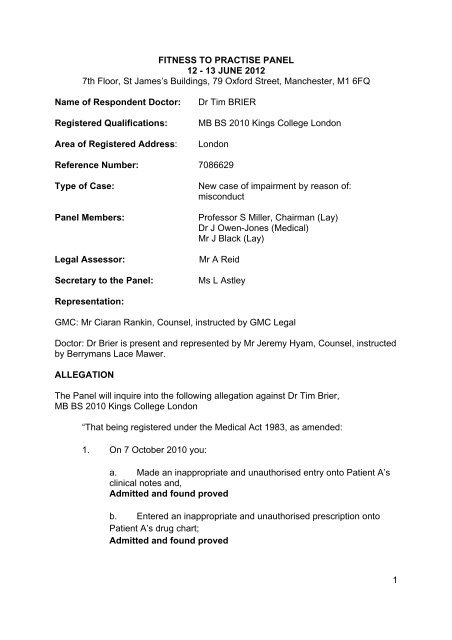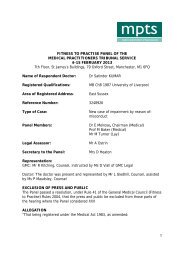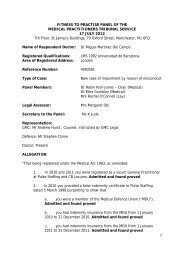PDF document
PDF document
PDF document
Create successful ePaper yourself
Turn your PDF publications into a flip-book with our unique Google optimized e-Paper software.
FITNESS TO PRACTISE PANEL<br />
12 - 13 JUNE 2012<br />
7th Floor, St James’s Buildings, 79 Oxford Street, Manchester, M1 6FQ<br />
Name of Respondent Doctor: Dr Tim BRIER<br />
Registered Qualifications: MB BS 2010 Kings College London<br />
Area of Registered Address: London<br />
Reference Number: 7086629<br />
Type of Case: New case of impairment by reason of:<br />
misconduct<br />
Panel Members: Professor S Miller, Chairman (Lay)<br />
Dr J Owen-Jones (Medical)<br />
Mr J Black (Lay)<br />
Legal Assessor: Mr A Reid<br />
Secretary to the Panel: Ms L Astley<br />
Representation:<br />
GMC: Mr Ciaran Rankin, Counsel, instructed by GMC Legal<br />
Doctor: Dr Brier is present and represented by Mr Jeremy Hyam, Counsel, instructed<br />
by Berrymans Lace Mawer.<br />
ALLEGATION<br />
The Panel will inquire into the following allegation against Dr Tim Brier,<br />
MB BS 2010 Kings College London<br />
“That being registered under the Medical Act 1983, as amended:<br />
1. On 7 October 2010 you:<br />
a. Made an inappropriate and unauthorised entry onto Patient A’s<br />
clinical notes and,<br />
Admitted and found proved<br />
b. Entered an inappropriate and unauthorised prescription onto<br />
Patient A’s drug chart;<br />
Admitted and found proved<br />
1
And that by reason of the matters set out above your fitness to practise<br />
is impaired because of your misconduct.”<br />
Determination on Rule 17(2)(g) application<br />
Mr Hyam:<br />
You have made an application on behalf of Dr Brier under Rule 17 (2) (g) of the<br />
General Medical Council (Fitness to Practise) Rules 2004 (the Rules) that insufficient<br />
evidence has been adduced to support a finding of impairment.<br />
You referred the Panel to the judgment of Lane LCJ in the criminal case of R v<br />
Galbraith [1981] 2 All ER 1039. His Lordship stated:<br />
Where the judge comes to the conclusion that the Crown evidence, taken at<br />
its highest, is such that a jury properly directed could not properly convict on it,<br />
it is his duty, on a submission being made, to stop the case.<br />
You submitted that it was appropriate to apply that approach to the current<br />
application, and that the evidence adduced in this case was such that, taken at its<br />
highest, a properly advised panel could not properly conclude that Dr Brier’s Fitness<br />
to practise is impaired by reason of his misconduct.<br />
You referred the panel to the cases of Calhaem [2007] EWHC 2606 (Admin),<br />
Cheatle [2009] EWHC 645 (Admin)and Nandi [2004] EWHC 2317 (Admin) and<br />
submitted that a properly advised panel would first be required to consider whether<br />
the matters found proved were sufficiently serious as to amount to misconduct for<br />
the purposes of impairment. You submitted that to be so serious they would have to<br />
be regarded as deplorable by other practitioners, and that the matters found proved<br />
in this case fall below that threshold. Accordingly, a properly advised panel would<br />
find that there was no misconduct and would not proceed further.<br />
You submitted that even if a panel were to conclude that the matters found proved<br />
were of sufficient seriousness as to constitute misconduct, and were therefore to<br />
proceed further, there was insufficient evidence to support a finding of impairment by<br />
reason of that misconduct. You reminded the panel that Dr Brier had admitted the<br />
matters concerned, that they were part of an isolated incident, that no patient had<br />
been put at risk, that evidence had been adduced that the Doctor had reflected on<br />
his wrongdoing and that it was most unlikely to be repeated.<br />
Mr Rankin, on behalf of the GMC, opposed your application on the ground that the<br />
evidence adduced is sufficient to support a finding of impairment. On the issue of<br />
seriousness, he reminded the panel that Dr Brier had admitted making inappropriate<br />
and unauthorised entries on the clinical notes and drug chart of a patient for whom<br />
he had no clinical responsibility. His actions were in breach of the GMC publication<br />
Good Medical Practice and of Section 6 c) of the GMC guidance <strong>document</strong> The New<br />
Doctor. Mr Rankin submitted that the evidence was such that a properly advised<br />
panel could properly find those actions to be sufficiently serious as to constitute<br />
misconduct for current purposes and that sufficient evidence had been adduced to<br />
2
enable such a panel properly to conclude Dr Brier’s fitness to practise is impaired by<br />
reason of his misconduct. Further, Mr Rankin submitted that such a panel would also<br />
be required to consider the need to declare and uphold proper standards of conduct<br />
and behaviour so as to maintain public confidence in the profession. He said a panel<br />
could properly conclude that a finding of impairment was required in order to meet<br />
that need.<br />
The Panel has accepted the advice of the Legal Assessor. He referred the panel to<br />
the cases of Cheatle, Remedy, Cohen and Grant. He advised that a properly advised<br />
panel would be required to first consider whether the matters found proved were<br />
sufficiently serious that they could properly be described as misconduct going to<br />
fitness to practise. Only if such a panel concluded that they were, should it go on to<br />
consider whether by reason of that misconduct Dr Brier’s fitness to practise is<br />
impaired. The Legal Assessor advised that in reaching its decision on the second<br />
question such a panel would be required to look forward and consider whether the<br />
Doctor is likely to repeat his misconduct. To this end it should consider whether and<br />
to what extent it had received evidence of insight and remediation on the part of the<br />
doctor.<br />
In addition, the Legal Assessor advised that even if such a panel concluded that<br />
there was no future risk it would, as Mr Rankin had submitted, be required to ask<br />
itself, in light of the evidence adduced, whether the need to uphold proper<br />
professional standards and public confidence in the profession would be undermined<br />
if a finding of impairment of fitness to practise were not made in the circumstances of<br />
this case. If it concluded that that need would be undermined then that panel would<br />
be required to make a finding of impairment.<br />
The facts of this case relate to entries made by Dr Brier on 7 October 2010 into the<br />
case notes and drug chart of Patient A, an elderly relative of Dr Brier who was being<br />
treated at the Eastbourne District General Hospital. The entry in the case notes<br />
asked the staff responsible for the care of Patient A whether they would provide a<br />
brief report either to Dr Brier or to another relative once Patient A’s condition had<br />
become clearer. The entry in the drug chart would have had the effect of changing<br />
the regime for the administration of a particular drug, senna, a laxative, from an ‘as<br />
required’ dose to a ‘regular’ dose; in the event, the hospital staff did not act on<br />
Dr Brier’s entry.<br />
At the time of these events Dr Brier was neither responsible for the care of Patient A,<br />
nor was he employed by the Hospital in which she was being treated. Accordingly<br />
Dr Brier has admitted, and the Panel has found proved, that his actions in making<br />
these entries were inappropriate and unauthorised.<br />
In determining whether sufficient evidence has been adduced to allow a panel,<br />
properly advised, to find Dr Brier’s Fitness to Practice impaired, the Panel first<br />
considered the issue of misconduct.<br />
In relation to Paragraph 1a, the Panel noted that Dr Brier’s entry into Patient A’s<br />
clinical notes consisted simply of a note requesting hospital staff to contact the<br />
patient’s relatives when more information was available; the entry made no<br />
3
comments or suggestions about Patient A’s treatment, nor did it raise any clinical<br />
issues. For this reason, the Panel has concluded that, viewed in isolation, a panel<br />
considering this matter could not properly regard the entry as a sufficiently serious<br />
breach of standards to support a finding of misconduct.<br />
In relation to Paragraph 1b concerning Dr Brier’s unauthorised entry in Patient A’s<br />
drug chart, the Panel took account of the following guidance:-<br />
The New Doctor (2009) at Paragraph 6 states:<br />
“Good clinical care<br />
F1 doctors must:<br />
(a) demonstrate that they recognise personal and professional<br />
limits, and ask for help from senior colleagues…….when necessary.<br />
(b) know about and follow our guidance on the principles of Good<br />
Medical Practice and the standards of competence, care and conduct<br />
expected of doctors registered with the GMC.<br />
(c) demonstrate that they are taking increasing responsibility, under<br />
supervision and with appropriate discussion with colleagues, for patient<br />
care, putting the patient at the centre of their practice by:<br />
…<br />
(ix) using medicines safely and effectively (under supervision)<br />
including giving a clear explanation to patients”<br />
Good Medical Practice (GMP) at Paragraph 5 states that:<br />
“Wherever possible, you should avoid providing medical care to anyone with<br />
whom you have a close personal relationship”<br />
This Panel considers that it would be open to a panel to conclude that Dr Brier’s<br />
conduct is in breach of all of the above guidelines. In particular, the Panel was<br />
concerned that Dr Brier appeared not to have recognised the impropriety involved in<br />
altering the prescription of a patient for whom he was not responsible. This was<br />
done despite Dr Brier having no formal standing within the East Sussex Hospitals<br />
NHS Trust where Patient A was being treated and without the agreement of the<br />
clinicians in charge of the patient. The Panel is satisfied that a panel, properly<br />
advised, could find this action sufficiently serious to amount to misconduct.<br />
The Panel then went on to consider whether this misconduct could properly form the<br />
basis of a finding of impairment. In so doing, it has taken account of the agreed<br />
witness statement of Mr B, Director of Medical Education at Barnet and Chase Farm<br />
Hospitals NHS Trust (Dr Brier’s employers). Mr B stated that he had discussed the<br />
allegations with Dr Brier and that, in his opinion, Dr Brier had genuinely reflected on<br />
the inappropriateness of his behaviour and was unlikely to make similar errors of<br />
4
judgement in the future. As a result, the Trust had not considered it appropriate to<br />
limit Dr Brier’s activities or responsibilities in the remainder of his F1 post.<br />
The Panel has also borne in mind that the errors of judgement in this case arise from<br />
a single incident and that Dr Brier has accepted from an early stage that his actions<br />
were inappropriate and admitted all charges against him. The Panel considered that,<br />
on the basis of the evidence adduced, a panel would be bound to conclude that his<br />
misconduct had been remediated, that Dr Brier had insight into the matters at issue,<br />
and that there was no significant risk of repetition.<br />
However, notwithstanding the issue of remediation, the Panel recognises that before<br />
reaching a decision of no impairment, a panel considering the matter would need to<br />
take account of the requirement to protect the public interest. This includes not only<br />
the protection of patients, but also the maintenance of public confidence in the<br />
profession, and the declaring and upholding of proper standards of conduct and<br />
behaviour. In this respect, the Panel has been guided by paragraph 101 in the<br />
judgement of Cox J in the case of Grant [2011] EWHC 927 (Admin) which states:-<br />
The Committee should therefore have asked themselves not only whether the<br />
Registrant continued to present a risk to members of the public, but whether the<br />
need to uphold proper professional standards and public confidence in the<br />
Registrant and in the profession would be undermined if a finding of impairment<br />
of fitness to practise were not made in the circumstances of this case. “<br />
In considering this question, the Panel has borne in mind the following factors: that at<br />
the time of these events Dr Brier was a young and relatively inexperienced doctor<br />
seeking to assist an elderly patient; that he communicated precisely what he had<br />
done to the relevant parties (albeit that they were inappropriate and unauthorised);<br />
that there were no harmful consequences of his actions. Given also the evidence on<br />
insight and remediation, and the fact that Dr Brier’s actions did not involve<br />
dishonesty or abuse of trust, the Panel considers that a panel could not properly<br />
conclude that the public interest would be undermined by a finding of no impairment.<br />
In all the circumstances therefore the Panel is satisfied that, taken at its highest, the<br />
evidence adduced by the GMC could not lead a panel to conclude that Dr Brier’s<br />
fitness to practice is impaired by reason of his misconduct. Accordingly, the Panel<br />
has acceded to your application under Rule 17(2)(g) that there is no case to answer.<br />
Confirmed<br />
Date: Chairman<br />
5




